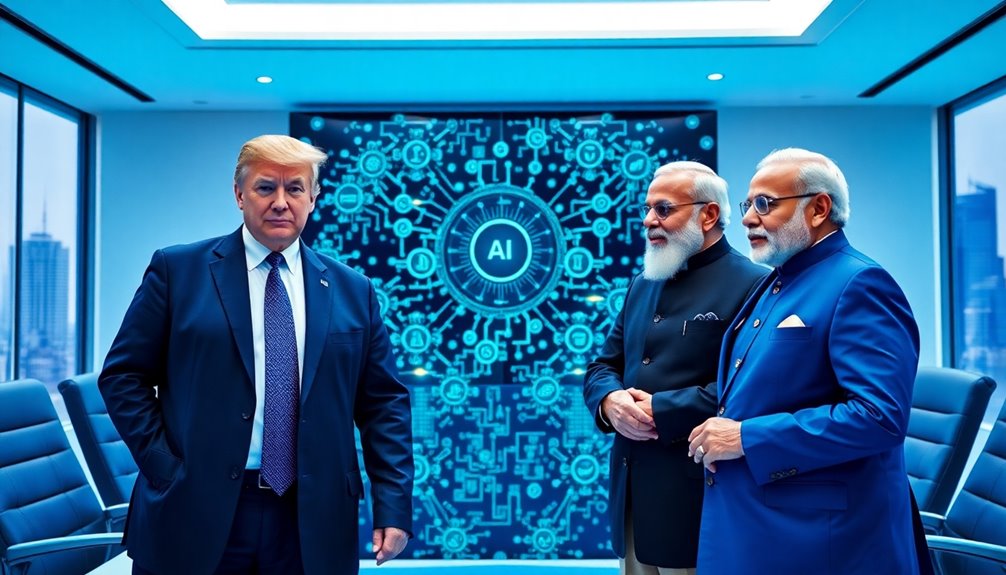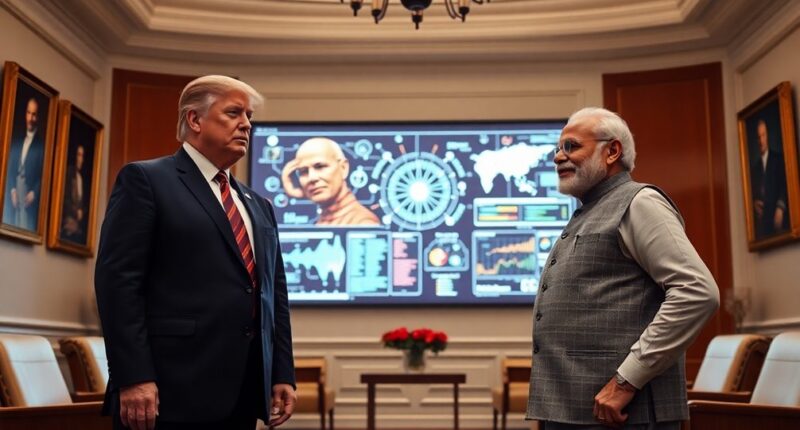You've likely noticed the growing emphasis on artificial intelligence in global politics. With Macron setting the pace in AI advancements, Trump's recent alliance with Modi signals a strategic shift. This partnership aims to enhance technology collaboration across critical sectors. But what implications could this have for international relations and competition, particularly with nations like China? The outcomes of this initiative could reshape the landscape of tech innovation and security.

As the global landscape for artificial intelligence evolves, former President Donald Trump has teamed up with Indian Prime Minister Narendra Modi to spearhead transformative advancements in AI and other critical technologies. This partnership, known as the US-India TRUST initiative, aims to enhance collaboration in areas like defense, semiconductors, quantum computing, biotechnology, energy, and space. By focusing on these sectors, you're witnessing a strategic move to bolster not just national security but also economic growth through technological innovation.
A significant part of this initiative involves developing resilient supply chains for semiconductors, critical minerals, and pharmaceuticals. You'll see how the emphasis on creating trusted and secure supply chains could mitigate risks associated with global dependencies. The initiative also aims to reduce regulatory barriers, making it easier for companies to invest and collaborate across borders. This could lead to increased public and private investments, expanding manufacturing capacities and driving economic growth.
One of the key aspects of the partnership is the roadmap for accelerating AI infrastructure development. By the end of the year, you can expect to see specific strategies addressing the challenges of financing, building, and powering large-scale AI systems. This includes fostering industry partnerships to invest in next-generation data centers, which will be essential for supporting AI innovations. India's commitment to procure 19,000 GPUs will enhance access to cutting-edge technology for start-ups and researchers, making AI more accessible and innovative. You'll notice how the focus on AI model innovations aims to tackle societal challenges, making this tech more applicable to everyday life. Additionally, the integration of blockchain technology can provide enhanced security and transparency in AI applications, further driving innovation.
In the realm of semiconductors and quantum computing, both nations are working together to enhance production capabilities and secure critical technologies. This collaboration strengthens research partnerships between US and Indian institutions, fostering a shared commitment to advancing mutual interests. As the global competition intensifies, especially with rising players like China, the need for technological sovereignty becomes more pronounced. You'll find that this partnership not only addresses immediate technological needs but also aims to reduce reliance on foreign models.
Moreover, there's a growing emphasis on sustainable AI practices, echoing sentiments from global leaders like Macron. As the US plans to invest $500 billion in AI and Europe proposes €109 billion, it's clear that this partnership is part of a broader strategy to secure a competitive edge in the ever-evolving landscape of artificial intelligence.
Through these advancements, you're witnessing a pivotal moment in global tech collaboration, one that could reshape the future of AI and its applications.









